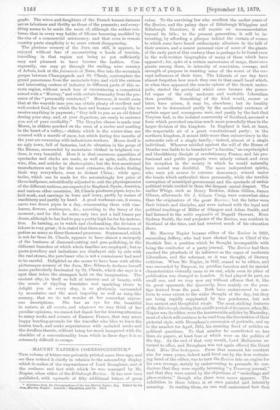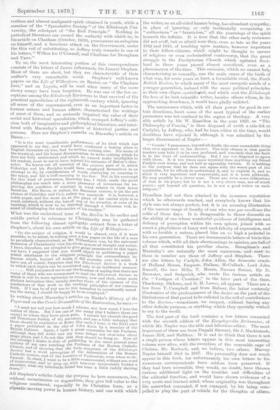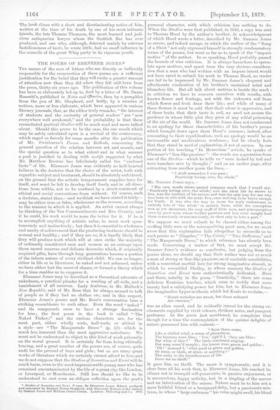MACVEY NAPIER'S CORRESPONDENCE.*
'Tins volume of letters was privately printed some time ago, and we then noticed it chiefly in relation to the astounding display which it makes of the waywardness of Lord ]3rougham, and of the coolness and tact with which he was managed by Mr. Napier, when editor of the Edinburgh Review. It has now been published, with upwards of fifty additional letters of great * ..5elecifono from Ma Correopondoore of Me mea Arnevey Napier, E. Edited by hie Son,Macvey Napier. Loudon : Macmillan and Co. 1879. value. To the surviving few who recollect the earlier years of the Review, and the palmy days of Edinburgh Whiggism and Edinburgh literature, it will require no recommendation beyond its title ; to the present generation, it will be in- teresting, by affording a glimpse behind the curtain of scenes to which some have heard enthusiastic allusions in the talk of their seniors, and a nearer personal view of some of the giants of the early part of this century than is perhaps to be found even in the well-written biographies of many of them which have appeared ; for, spite of a certain narrowness of range, there were giants among them, in intensity of conviction, courage, and strength of purpose in resisting some of the worst of the cor- rupt influences of their time. The Liberals of our day have almost forgotten how much they owe to that small band which, in what then appeared the remote sphere of the Scotch metro- polis, started the periodical which soon became the power- ful organ of the only moderate and workable Liberalism then possible. Something of the kind would, sooner or later, have arisen, it may be, elsewhere ; but its locality came to be determined partly by the accidental existence of certain eager and courageous men, and partly by the fact that Toryism had, in the isolated community of Scotland, assumed a form which provoked reaction much more powerfully than in the larger division of the kingdom. In England it had, at least, the respectable air of a great constitutional party ; in the northern kingdom, it meant little more than subserviency to the autocratic rule of a singly family,—indeed, almost of a single individual. Whoever rebelled against the will of the House of Dundas was liable to be branded as " a Jacobin," an unprincipled and bloodthirsty disciple of revolutionary France, and his pro- fessional and public prospects were utterly ruined, and even his reception in the society in which he would naturally have moved was doubtful. The more independent spirits, who were yet averse to extreme democracy, winced under the bonds which enthralled them personally, while the terrible corruption of municipal government and the spectacle of unfair political trials excited in them the deepest moral disgust. The earlier Whigs, such as Henry Erskine, Adam Gillies, James Gibson, afterwards Sir J. Gibson Craig, were somewhat older than the originators of the great Review ; but the latter were their friends and disciples, and were imbued with the legal and political teachings of Miller of Glasgow and Adam Smith, and had listened to the .milis swpientia of Dugald Stewart. Even Sydney Smith, the real projector of the Review, was resident in Scotland. at the time, and had received much of his education there.
Mr. Macvey Napier became editor of the Review in 1829, succeeding Jeffrey, who had been elected. Dean or Chief of the Scottish Bar, a position which he thought incompatible with being the conductor of a party journal. The Review had then reached the plenitude of its influence as the organ of moderato Liberalism, and the reformer, as it was thought, of literary criticism. When Mr. Napier, in 1847, ceased to be editor, and was succeeded by Empson, its peculiar function and its special characteristics virtually came to an end, while even its place of publication was changed to London. It had played its part, no small one, and we may now say without offence that it, like its great opponent, the Quarterly, lives mainly on the pres- tige derived from the past. Both have endeavoured to con- form to some extent to the wider thought of the day, but they are being rapidly supplanted by less ponderous, but not less earnest and thoughtful rivals. The most striking features of the Edinburgh, during that middle period of its career, when Mr. Napier was its editor, were the innumerable articles by Macaulay, most of which will continue to be read from the fascination of their pictorial style, with Brougham's succession of portraits, and up to the number for April, 1885, his amazing flood of articles on political questions. To that number he contributed no less than six papers, at least four of which were on the politics of the day. At the end, of that very month, Lord Melbourne re- turned to office, and Brougham was not again offered. the Great Seal. Hine iliac lathrrnae. From that moment his constant aim for some years, indeed until tired. out by the firm restrain- ing hand of the editor, was to turn the Review into an engine for his own revenge, mainly by endeavouring to persuade its con- ductors that they were rapidly becoming " a Treaeury journal," and that they were scared by the objections of "underlings and place-seekers," though who those were never appears. The exhibition in these letters is at once painful and intensely amusing. In reading them, we can well understand how that
restless and almost malignant spirit obtained in youth, while a member of the " Speculative Society " of the Edinburgh Uni- versity, the sobriquet of "the Evil Principle." Nothing in periodical literature can exceed the audacity with which he, in his article on Chatham (October, 1839), pronounces an eulogium on himself, and a ferocious attack on the Government, under the thin veil of substituting, as Jeffrey truly remarks in one of his letters, " Wilkes for O'Connell, and Chatham for Brougham and Vaux."
To us, the most interesting portion of this correspondence
consists of the letters of James (afterwards Sir James) Stephen. Most of them are short, but they are characteristic of their author's very remarkable mind. Stephen's well-known papers on the Life of 'Wilberforce, on Baxter, on " the Clapham Sect," and on Loyola, will be read when many of the more showy essays have been forgotten. He was one of the few ex- ceptions among the Edinburgh Reviewers to that survival of the practical agnosticism of the eighteenth century which, ignoring all sense of the supernatural, even as an important factor in human nature and human affairs, characterised the writings of most of them, and so seriously impaired the value of their social and historical speculation, which cramped Jeffrey's criti- cism both of imaginative and philosophical literature, and inter- fered with Macaulay's appreciation of historical parties and persons. Here are Stephen's remarks on Macaulay's article on Bacon :— " It is the most considerable performance of its kind which has appeared in my day, and would have conferred a lasting place in English 'literature on him, had he written nothing else. Ms scorn of the mystical, and his honest determination to write nothing which ho does not fully understand, and which he cannot make intelligible to his readers, seem to me to have injured his estimate of Bacon's char- acter. He leaves out all mention of the gaseous part of it, which Coleridge and his disciples would have employed themselves in an attempt to fix, by combinations of words convoying no meaning to the many, and but a half-moaning to the few. But in his contempt for this kind of pretension, Macaulay has, I think, made the great philosopher too much into a more promoter of inventions for im- proving the condition of mankind in what relates to their lower faculties. His Bacon, or rather, his Baconian system, is (in the pet phrase of Coleridge and Co.), rather too sensuous. It is, however, a noble paper, and the more so, as the glare of his earlier style is so much subdued, without the loss of any of its vivacity, or oven of its learning, which is now to be detected through a decorous veil, in- stead of challenging the admiration of his readers."
What was the understood tone of the Rejew in its earlier and middle period in reference to Christianity may be gathered from the following almost apologetic extract from a letter of Stephen's, about his own article on the Life of Wilberforce
On the subject of religion, it would ho absurd, even if it were
possible, to be silent, in writing pages on the life of a man BO peculiarly even alew arly characterised, as Mr. Wilberforce was, by the universal dominion of Christianity over his whole system of thought and action. I have, therefore, not scrupled to give great prominence to this topic, nor have I supposed that you would object to publishing a paper which attributes to the religions principle the extraordinary in-
i
fluence which, beyond all doubt, it did exorcise over his mind. I have not, of course, forgotten that the Edinburgh Review is a work in which such topics can be mentioned only in an incidental manner. ...... Will you permit me to use the freedom of saying that there are many of those who are accustomed to read the Ediaburgh Review to whom it will be more agreeable to receive, now and then, some more distinct intimation than usually reaches them of the consent of the conductors of that work to the cardinal principles of our common faith. If I can be of any use to you hereafter in occasionally sound rug the string, I should be happy to be so employed."
In writing about Macaulay's articles on Ranke's History of the .Popes and on the Comic Dramatists of the Restoration, ho says :— " I need not toll you how much I admire, nor how much I love the author of thorn. But I am one of the many (for I believe there are many) to whom they have given pain. I cannot but cherish the good old Protestant feeling of my ancestors, and am a little unhappy that
should bo exultation at Rome there (for such, I hear, is the fact) over a paper published in the city of John Knox by a member of the British Cabinet. Again, I have a great veneration for the Puritans, although they did write and
say some things not over-wise about stage plays, and I do not like that they should be flung at. Now all the revenge I desire is that of publishing in the same journal some notions of my own touching the Puritans of the Homan Catholic Church, and of showing that the body corporate of the Edinburgh Review has a vivid perception of the deformities of the Roman Catholic system, and of the beauties of Puritanism, even when so de- formed. In short, 0 , I want to be a little controversial, without one word of controversy, and to prop up, with however incalculably feebler a shoulder, what my inimitable friend has been a little rudely shoving down."
All Stephen's articles fulfil the purpose he here announces, for, without sectarianism or dogmatism, they give full value to the religious sentiment, especially in its Christian form, as a gigantic moving power in human history, and one with which the writer, as an all-sided human being, has abundant sympathy,. in place of ignoring, or only incidentally recognising as " enthusiasm " or " fanaticism," all the yearnings of the spirit towards the infinite. It is true that the other early reviewers did not scoff, but so afraid were they, even as late as the years 1842 and 1843, of touching upon matters, however important to their fellow-citizens, which might be thought to savour of religious or even ecclesiastical controversy, that the great struggle in the Presbyterian Church which agitated Scot- land in those years passed almost unnoticed, even as a phenomenon of the time. This omission, which we cannot help characterising as cowardly, was the main cause of the birth of what was, for some years at least, a formidable rival, the worth British Review, to which many of the most energetic minds of a. younger generation, imbued with the same political principles as their own clique, contributed, and which cost the Edinburgh, the loss of its best scientific writer, besides others whom, in its approaching decadence, it would have gladly enlisted.
The narrowness which, with all their power for good in cer- tain directions, beset some of the most typical of the earlier promoters was not confined to the region of theology. A very able article by Sir W. Hamilton in the year 1829, on "The Philosophy of Cousin," is thus disposed of (with a side-hit at Carlyle), by Jeffrey, who, had he been editor at the time, would doubtless have rejected it, although it was admitted by the. larger discernment of Napier
" Cousin' I pronounce, beyond all doubt, the most unreadable thing that ever appeared in the Review. The only chance is that gentle• readers may take it to be very profound, and conclude that the fault is in the want of understanding. But I am not disposed to agree with them. It is ton times more mystical than anything my friend Carlyle ever wrote, and not half so agreeably written. It is nothing to the purpose that he does not agree with the worst part of the- mysticism, for ho affects to understand it, and to explain it, and to think it very ingenious and respectable, and it is mere gibberish.. 11 e may possibly be a clever man. There are even some indications of that iu his paper, but he is not a very clever man, nor of much power ; and beyond all question, ho is not a good writer on such subjects."
Hamilton had not then attained to the immense reputation which he afterwards reached, and everybody knows that his style was not always perfect, but it is an amusing illustration of the narrow range of faculty of one who was par excellenee the
critic of those days. It is disagreeable to throw discredit on the ability of one whose wonderful gmkkness of intelligence and delicacy of perception within his own sphere, joined with son sweet a playfulness of fancy and such felicity of expression, and with so lovable a nature, placed him on so high a pedestal in his own generation. There are innumerable letters of hisiuthis• volume which, with all their shortcomings in opinion, are full of all that constituted his peculiar charm. Brougham's and Macaulay's are naturally the most numerous, and next to these in number are those of Jeffrey and Stephen. There
are also letters. by Carlyle, John Allen, the domestic oracle of Holland House, Empson, Hallam, McCulloch, Lord . John
Russell, the two Mills, T. Moore, Nassau Senior, Sir D. Brewster, and Scdgwick, who wrote the furious article on the "Vestiges of Creation ;" iu the later part of the time,
Thackeray, Dickens, and G. H. Lewes, all appear. There are a, few from T. Campbell and from Bulwer, the latter curiously illustrative of the predominance of the desire on the part of the
littorateurs of that period to be enlisted in the roll of contributors to the Ilevime,—eometimes, we suspect, without having any other definite purpose, or anything which they specially wished to say to the world.
The first part of the book contains a few letters connected with the seventh edition of the Encyclopedia Britannica, of which Mr. Napier was the able and laborious editor. The most important of these are from Dugald Stewart, Sir J. Mackintosh,. James Mill, and Malthus. It is sad to think that there is not a single person whose letters appear in this most interesting volume now alive, with the exception of the venerable sage of Chelsea, Mr. Roebuck, and, we believe, two others. Macvey Nepier himself died in 1847. His personality does not much appear in this book, for unfortunately his own letters to his
numerous correspondents have seldom been preserved. If'
they had been accessible, they would, no doubt, have thrown curious additional light on the troubles and difficulties of the editorial function, and would have shown evidences of a very acute and learned mind, whose originality was throughout life somewhat concealed, if not cramped, by his being con-. polled to play the part of vehicle for the thoughts of others. The book closes with a short and discriminating notice of him, written at the time of his death by one of his most intimate friends, the late Thomas Thomson, the most learned and judi- cious antiquarian lawyer whom the Scottish Bar has ever produced, and one who, although, deterred mainly by extreme fastidiousness of taste, he wrote little, had no small influence in the councils of the great Whig party in its vigorous youth.




































 Previous page
Previous page